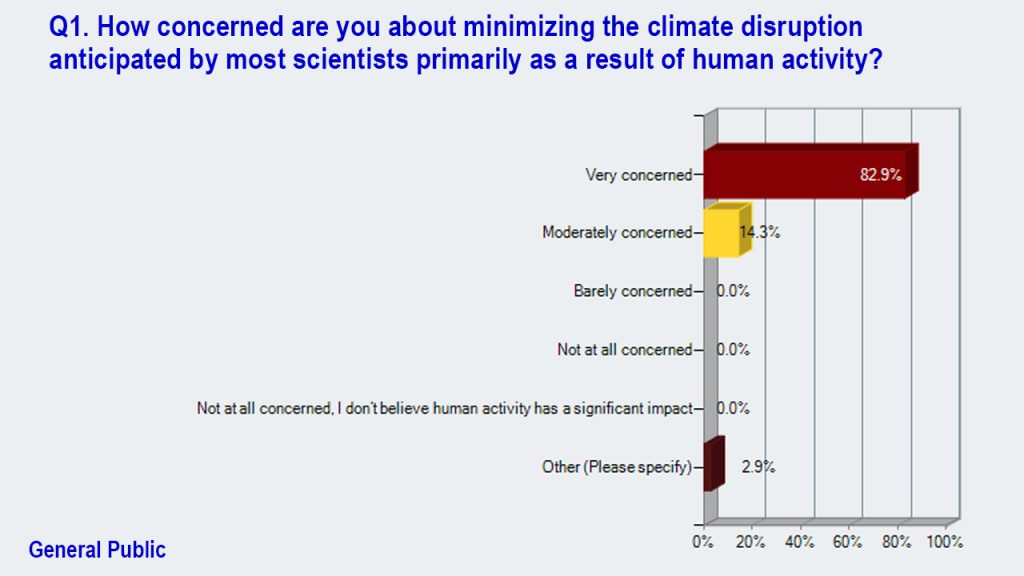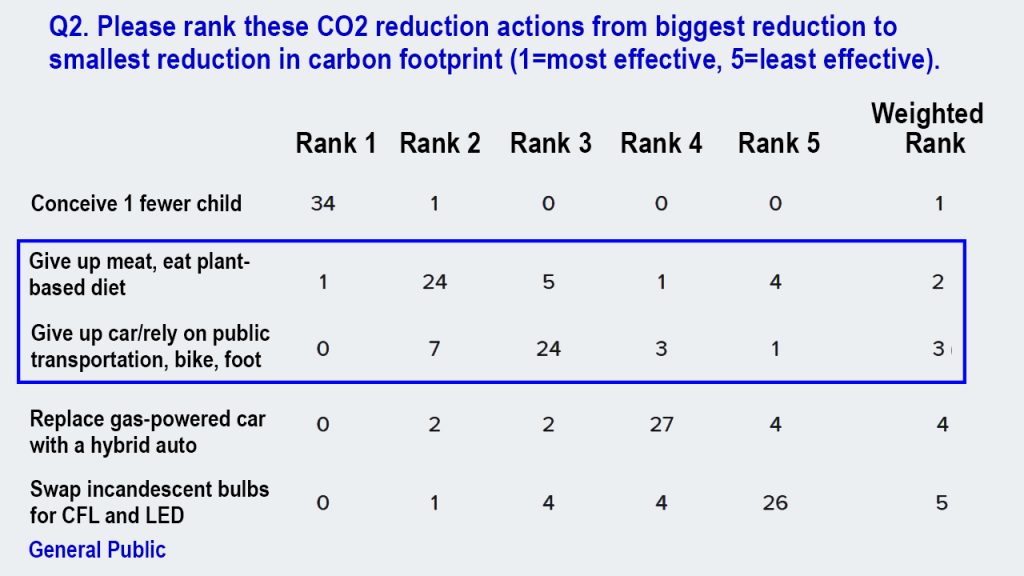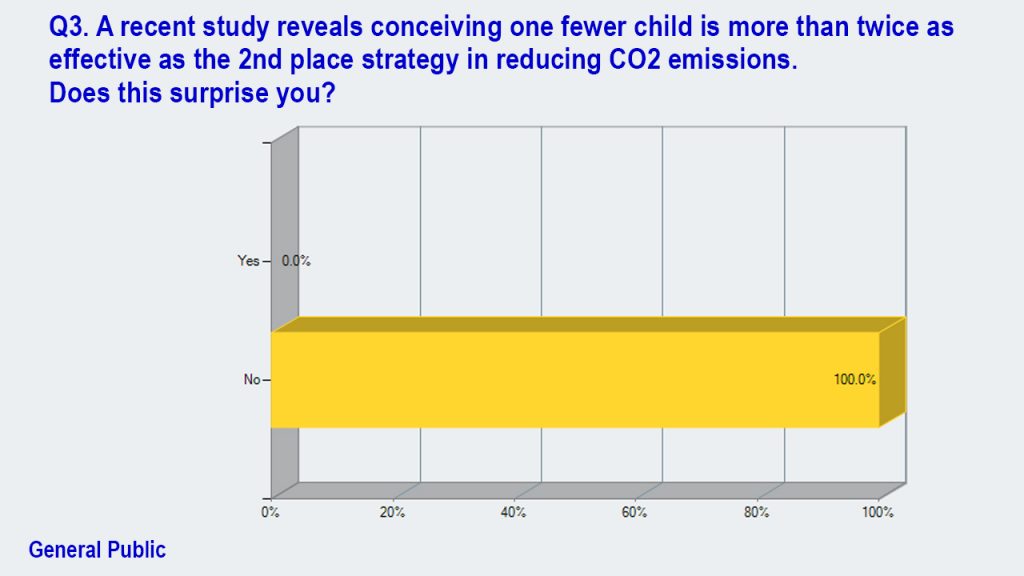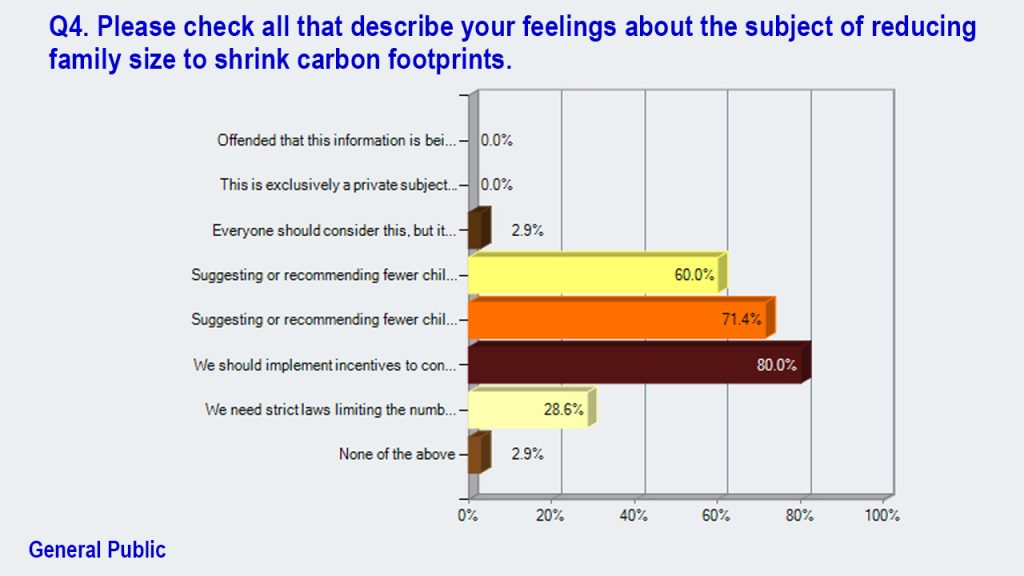While Elon Musk erroneously claims population collapse is our biggest worry, world population is hitting 8 billion, adding the latest billion faster than any time in history.


While Elon Musk erroneously claims population collapse is our biggest worry, world population is hitting 8 billion, adding the latest billion faster than any time in history.

What do the Green New Deal, Santa Claus and the tooth fairy have in common? Find out as we talk with the founder of The REAL New Green Deal Project.

One reason is that scientists have now documented choosing to conceive just one fewer child will reduce your carbon footprint a LOT more than any other “green” action. You’ll find that study VERY interesting. It’s bottom line: “until the emissions associated with desired services are reduced to zero, population will continue to be a multiplier of emissions.” Multiplier is the key word here.
That ought to be a “duh” statement, but – until recently – overpopulation was rarely mentioned, and DOING something to ease human population back to a wise and sustainable level was never mentioned in the scientific reports or news coverage of climate change. But that is finally changing.
This information, and the question heading this post, inspired us to do a few things:
Before I get into the details of these, if the media coverage of the issue is news to you, these commentaries at Growth Bias Busted will get you up to speed:
NPR Illuminates Important Conversation About Kids
Bill Nye Actually Discusses Planet-Saving Policy
One Action Reduces Your Carbon Footprint 100 Times More Than Driving a Hybrid
Ignorant Response to Good Reporting on Climate/Family Size Connection
Now, the details…
World Population Day Video – we kept this video very short, so it doesn’t give you a good sense of the overall response. I was a bit surprised that almost no one I approached expressed any offense at having a conversation about the link between family size and carbon footprint. This is very good news.
GrowthBusters Webinar – because bioethicist Travis Rieder has been such an articulate and positive spokesperson for this issue, I invited him to be our guest for the webinar, Fewer Children: A Moral Responsibility. The video replay of this webinar will be available for another week. After that, it moves to our webinar archive, available to all supporting members of GrowthBusters. (A very modest $7/month gets you access to all the webinars, plus a discount on growthbusting tools at our store, and more. Membership details here.)
Public Knowledge/Attitude on Climate/Family-Size Connection – Leading up to the webinar, we ran a brief survey to gauge the level of knowledge and to further test our hypothesis that people are finally ready to talk about conceiving fewer children in order to have a hospitable climate.
We actually ran the survey twice – we gave one survey link to those subscribed to our GrowthBusters email updates, and we publicized another more generally on social media. We did that to see if the general public isn’t as far along this curve as those with a more intense interest in GrowthBusting. Of course we did not have a truly random, scientific sample, so the “public” results are still a bit skewed through self-selection by more enlightened or concerned participants.
Here are the results for both groups:
 Q1 Though fewer members of the “general public” were “very concerned” about climate change than members of the GrowthBusters crowd, I was still impressed to see both groups were above 80%.
Q1 Though fewer members of the “general public” were “very concerned” about climate change than members of the GrowthBusters crowd, I was still impressed to see both groups were above 80%.
 Q2 Here it was good to see that conceiving one fewer child was rated by both groups as the most effective action in reducing carbon footprint. Also interesting to note that giving up your car was neck and neck with giving up meat among the “public” but that plant-based diet slips to third among the growthbusting crowd. Turns out, according to the best study so far of the impacts of these actions, giving up the car is yields about twice the carbon reduction as giving up meat.
Q2 Here it was good to see that conceiving one fewer child was rated by both groups as the most effective action in reducing carbon footprint. Also interesting to note that giving up your car was neck and neck with giving up meat among the “public” but that plant-based diet slips to third among the growthbusting crowd. Turns out, according to the best study so far of the impacts of these actions, giving up the car is yields about twice the carbon reduction as giving up meat.
 Q3 First of all, I regret that I worded this question so poorly. It should have read that conceiving one fewer child is more than 20 times as effective as the 2nd place strategy. The results are still relevant, however. I’m surprised this surprised no one from the general public in our survey, while it did surprise 4% of the growthbusting group. I have no explanation for this.
Q3 First of all, I regret that I worded this question so poorly. It should have read that conceiving one fewer child is more than 20 times as effective as the 2nd place strategy. The results are still relevant, however. I’m surprised this surprised no one from the general public in our survey, while it did surprise 4% of the growthbusting group. I have no explanation for this.
 Q4 Since many of these questions are truncated in the graphics, here are the complete descriptions of feelings:
Q4 Since many of these questions are truncated in the graphics, here are the complete descriptions of feelings:

Isn’t it time for the recommendation to go out far and wide that young couples should choose to have no children, or at most one child, until world population coasts back down to a sustainable level? The connection between family size decisions, climate change and carbon footprint has been getting more and more press, so we at GrowthBusters wondered if the time had finally come.
Is the public ready to acknowledge we have a moral responsibility to have fewer children?
We took to the streets of Colorado Springs yesterday morning to find out, and we were pleasantly surprised. While this is by no means a scientifically valid sample, it was completely random. We chatted with young and old, men and women, people of limited means and people who were materially well off. See for yourself what kind of responses we got:
The good news is most of the people we encountered were not offended by the idea of suggesting or recommending fewer children.
No one favored “sending SWAT teams into the bedroom” to enforce mandatory restrictions on procreation. But most felt it’s a good idea to let people know the benefits of a little less procreation and a little more contraception. The time has come. Perhaps we can get the Ad Council to start putting out public service announcements and billboards recommending we all do our part.
I’d like to give a shout out to Colorado College film and media students Kaitlyn Hickmann and Ben Bacher for doing the filming of our interviews, and to Kaitlyn for editing this masterpiece. Thanks, also, to Sasha, for being the subject of our first ever dog-on-the-street interview.
Building on this momentum, promoting safe practices is paramount in today’s society. In line with this, it has become easier than ever to buy condoms online, offering discreet and convenient options for responsible choices. Together, we can make these practices a seamless part of our daily lives.
A few interesting facts:

You can play today’s episode right here:
Today’s episode features some revealing observations from Eben Fodor, the community planning consultant who penned the excellent book, Better, Not Bigger. You probably always suspected the game is rigged in your own community – real estate developers pull all the strings. This comes up as I unpack the insanity of economic developers recruiting new businesses (and the population growth that follows) in places like Arizona and Nevada, as the water level in Lake Mead drops to levels not seen in over 30 years.
I also take the United Nations and UNFPA to task for leaving out the single most important point that should be included every year in World Population Day messaging:
We are in overshoot and need to scale back our population to a sustainable level.
(Yes, I know we also need to scale back our consumption in industrialized nations, but on World Population Day it seems appropriate to put the spotlight on the population multiplier in that famous I=PAT equation developed by Paul Ehrlich and John Holdren.)

Every year a theme is chosen for focus, and to commemorate the occasion, the U.N. Secretary-General issues a World Population Day statement. This year’s theme is “investing in teenage girls.”
Here’s a list of recent themes:
2016 – Investing in Teenage Girls
2015 – Vulnerable Populations in Emergencies
2014 – Investing in Young People
2013 – Focus is on Adolescent Pregnancy
2012 – Universal Access to Reproductive Health Services
2011 – 7 Billion Actions
2010 – Be Counted: Say What You Need
2009 – Fight Poverty: Educate Girls
2008 – Plan Your Family, Plan Your Future
2007 – Men at Work
2006 – Being Young is Tough
2005 – Equality Empowers
2004 – ICPD at 10
2003 – 1,000,000,000 adolescents